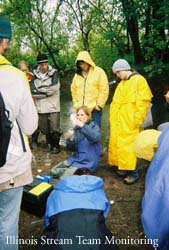 |
|
-June 2006- |
|
When "Clean" Water May Not Be Clean Enough
Under the Clean Water Act (CWA), municipal dischargers are required to disinfect the wastewater received by their water treatment plants. What many people do not realize is that the CWA also allows the Illinois Environmental Protection Agency (IEPA) to exempt individual municipal wastewater plants from the disinfection requirement, even though this water can contain bacteria and other pathogens.
In the late 1980s, the IEPA began exempting many municipal dischargers from the disinfection requirement for two primary reasons. First, there was increasing scientific evidence that the common practice of using chlorine as a wastewater disinfectant has significant negative impacts on aquatic organisms that live in rivers receiving treated wastewater. Second, the IEPA erroneously concluded that disinfecting wastewater was not necessary as people were not using the receiving streams; if no one uses the streams, then there is no need to be concerned about human exposure to pathogens. At this time, as Illinois demographics are rapidly changing, more Illinois residents are enjoying a variety of river-related activities, from fishing to kayaking. Some of the waterways used for these activities are downstream from exempted water treatment plants.
 In recent years,however, new techniques have been developed that eliminate the need to use chlorine as a water disinfectant. Examples include using ultraviolet (UV) light (which disrupts the genetic material of bacterial cells) and injecting ozone into the wastewater (which effectively destroys viral cell walls). The initial operational costs are greater to implement this technology; however, over the long term communities will enjoy the environmental and economic benefits of cleaner, safer rivers, and healthier communities.
In recent years,however, new techniques have been developed that eliminate the need to use chlorine as a water disinfectant. Examples include using ultraviolet (UV) light (which disrupts the genetic material of bacterial cells) and injecting ozone into the wastewater (which effectively destroys viral cell walls). The initial operational costs are greater to implement this technology; however, over the long term communities will enjoy the environmental and economic benefits of cleaner, safer rivers, and healthier communities.
The initial application or the renewal of a municipal NPDES requires a 30-day public comment period. This provides an important opportunity for citizens who enjoy their local streams to educate IEPA staff about human activities happening downstream of exempted treatment plants. An example of citizen action that effected change in municipal disinfection practices occurred recently in east central Illinois. Prairie Rivers Network, Sierra Club, members of the public, local watershed groups such as Friends of the Fox, Salt Fork River Partners, and the Champaign County 4-H provided information to IEPA on recreational activities downstream of exempt water treatment plants in Champaign and Sandwich. As a result of this citizen participation, these municipalities and others have decided start disinfection of their wastewater.
Discover whether your favorite stream is safe for recreation. Contact the nearest upstream municipal wastewater treatment plant or the IEPA Bureau of Water Permit Section at (217)782-0610. If the discharged water is not being disinfected, share with them the location of your favorite swimming hole or paddling stretch and ask for these uses to be protected.
Individuals and groups who monitor streams want to know if the data they collect can be used by IEPA for enforcement of water quality regulations. Unfortunately, at this time IEPA will only accept data collected from their staff scientists for enforcement purposes; however, if citizen monitor results show a trend of unusually high amounts of a certain pollutant, the IEPA will use that data to decide if the agency will take further action.